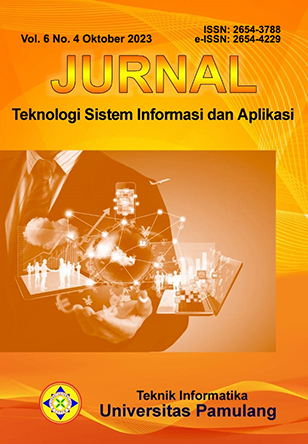Pengujian Regresi Otomasi pada Aplikasi Mobile Satudikti Menggunakan Katalon Studio
Keywords:
Black-box testing, Katalon studio, Automated regression testing, SatudiktiAbstract
Satudikti is a one-stop application from the many services available at the Directorate General of Higher Education, to make it easier for users to access various higher education services in one application. Before the application can be widely used, a testing step is indispensable. This is due to potential problems in higher education data that can have a fatal impact, considering that this data is closely related to state information. And if there is an error in the software, the Directorate General of Higher Education must restart the development process that can harm the state. Therefore, the purpose of this study is to test the readiness of the application when it is widely used and reduce the risk of errors to ensure that the application remains of sufficient quality for users, as well as analyze the effectiveness of the application and then whether automated regression testing using Katalon Studio has more value than manual testing. Testing in this study was carried out manually with the black-box testing method and automated testing using Katalon Studio as an automated testing tool. Testing using Katalon Studio found that the functionality, features, and access to the tested pages worked well according to existing requirements. The implementation of automation testing using Katalon Studio has also proven to be more efficient in reducing test time and providing detailed test results to detect errors with easy-to-understand reporting.References
Ardi, F., & Putro, H. P. (2021). Pengujian Black Box Aplikasi Mobile Menggunakan Katalon Studio (Studi Kasus: ACC Partner PT. Astra Sedaya Finance). AUTOMATA, 2(1).
Bamai Uma. (2022, November 12). Ditjen Dikti Ristek Luncurkan Aplikasi SatuDikti, Satu Aplikasi Untuk berbagai Kebutuhan. Bamai.Uma.Ac.Id. https://bamai.uma.ac.id/2022/11/12/ditjen-dikti-ristek-luncurkan-aplikasi-satudikti-satu-aplikasi-untuk-berbagai-kebutuhan/?%2F2022%2F11%2F12%2Fditjen-dikti-ristek-luncurkan-aplikasi-satudikti-satu-aplikasi-untuk-berbagai-kebutuhan%2F=
Bertolino, A. (2007). Software testing research: Achievements, challenges, dreams. Future of Software Engineering (FOSE’07), 85–103.
Dedi Wahyono. (2020). Automation Regression Testing Pada Aplikasi Ifocus Mobile Menggunakan Katalon Studio Studi Kasus Pt Gue. Universitas Atma Jaya Yogyakarta.
Ditjen Dikti. (2023). Profil Institusi Direktorat Jenderal Pendidikan Tinggi, Riset, dan Teknologi. Dikti.Kemdikbud.Go.Id. https://dikti.kemdikbud.go.id/profil-institusi-direktorat-jenderal-pendidikan-tinggi/
Herlinda, H., Katarina, D., Ambarsari, E. W., & Kom, M. (2019). Automation testing tool dalam pengujian aplikasi belajar tajwid pada platform Android. STRING (Satuan Tulisan Riset Dan Inovasi Teknologi), 4(2), 205–212.
Hme17. (2019, April 1). Akibat Bug Pada Aplikasi, Gojek Rugi Ratusan Juta Rupiah – Wartaindonews. Wartaindo.News. https://wartaindo.news/akibat-bug-pada-aplikasi-gojek-rugi-ratusan-juta-rupiah/
Kandil, P., Moussa, S., & Badr, N. (2015). A study for regression testing techniques and tools. International Journal of Soft Computing and Software Engineering [JSCSE], 5(4), 64–84.
Kusyadi, I., Prastika, A., Noviyanto, D., Aisah, S., & Mulyati, S. (2022). Pengujian Aplikasi Kas Keuangan Menggunakan Katalon. 5, 91–96.
Muslimin, D. B., Kusmanto, D., Amilia, K. F., Ariffin, M. S., Mardiana, S., & Yulianti, Y. (2020). Pengujian Black Box pada Aplikasi Sistem Informasi Akademik Menggunakan Teknik Equivalence Partitioning. Jurnal Informatika Universitas Pamulang, 5(1), 19–25.
Pramono Echo. (2022, August 11). Ditjen Dikti ristek Luncurkan Aplikasi SatuDikti, Satu Aplikasi untuk Berbagai Kebutuhan. Umko.Ac.Id. https://www.umko.ac.id/2022/08/11/ditjen-dikti-ristek-luncurkan-aplikasi-satudikti-satu-aplikasi-untuk-berbagai-kebutuhan/
Rianto, I. (2021). Rekayasa Perangkat Lunak. Penerbit Lakeisha.
Rizka Yulianti Pratiwi. (2020). Functional Testing Pada Aplikasi Mobile Acc.One [Universitas Atma Jaya]. http://e-journal.uajy.ac.id/id/eprint/22268
Saman, P., & Ratnasari, C. I. (2022). Pengujian Black Box Pada Aplikasi Pembelajaran Bahasa Mandarin Berbasis Android. Jurnal Ilmiah Intech: Information Technology Journal of UMUS, 4(01), 10–22.
Wicaksono, F. D., & Rani, S. (2022). Rancang Bangun Automation Test Journey pada E-Commerce. AUTOMATA, 3(2).
Downloads
Published
How to Cite
Issue
Section
License
Copyright (c) 2023 Abdullah Akram, Nunik Pratiwi

This work is licensed under a Creative Commons Attribution-NonCommercial 4.0 International License.
Authors who publish with this journal agree to the following terms:
- Authors retain copyright and grant the journal right of first publication with the work simultaneously licensed under a Creative Commons Attribution License that allows others to share the work with an acknowledgement of the work's authorship and initial publication in this journal.
- Authors are able to enter into separate, additional contractual arrangements for the non-exclusive distribution of the journal's published version of the work (e.g., post it to an institutional repository or publish it in a book), with an acknowledgement of its initial publication in this journal.
- Authors are permitted and encouraged to post their work online (e.g., in institutional repositories or on their website) prior to and during the submission process, as it can lead to productive exchanges, as well as earlier and greater citation of published work (See The Effect of Open Access).
Jurnal Teknologi Sistem Informasi dan Aplikasi have CC BY-NC or an equivalent license as the optimal license for the publication, distribution, use, and reuse of scholarly work.
In developing strategy and setting priorities, Jurnal Teknologi Sistem Informasi dan Aplikasi recognize that free access is better than priced access, libre access is better than free access, and libre under CC BY-NC or the equivalent is better than libre under more restrictive open licenses. We should achieve what we can when we can. We should not delay achieving free in order to achieve libre, and we should not stop with free when we can achieve libre.
This work is licensed under a Creative Commons Attribution-NonCommercial 4.0 International (CC BY-NC 4.0) License
YOU ARE FREE TO:
- Share - copy and redistribute the material in any medium or format
- Adapt - remix, transform, and build upon the material for any purpose, even commercially.
- The licensor cannot revoke these freedoms as long as you follow the license terms



_2020_-_7(2)_2024_-_Thumbnail.png)












